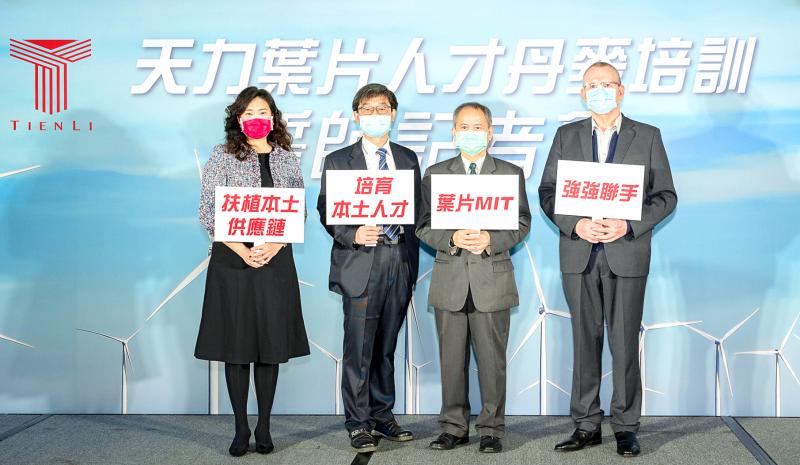Tien Li Offshore Wind Technology Co (天力離岸風電科技) is to send 50 employees to train in Denmark to become the first Taiwanese skilled turbine blade makers, the company told a new conference yesterday.
The employees would be trained by Danish turbine maker Vestas Wind Systems A/S for three months before returning to the firm’s Taichung turbine blade factory, which is slated to start operations in June, Tien Li said.
The first blades would be produced in July, and the company has given itself one year to reach the quality standards set by Vestas, Tien Li chairman K.D. Wu (吳坤達) said.

Photo courtesy of Copenhagen Infrastructure Partners
“There will be a learning curve,” Wu said. “Hopefully by August next year, we will hit the world-class standards demanded by Vestas.”
Joe Chen (陳盈秀), one of the employees who is headed to Denmark, said it was a rare opportunity that allowed her to transform her career path.
“I was working in Singapore in the service sector, which was hit hard by the COVID-19 pandemic,” said Chen, who studied management.
“I am excited that my company is giving me an opportunity to train for a highly technical position,” she said.
Chen and the other trainees would be making turbine blades out of composite materials for Vestas’ 9.5 megawatt V174 turbines, which have 85m blades.
“We will be providing world-class instruction in Denmark to develop Taiwan’s new offshore wind farm talent,” Vestas Taiwan project director Bjarne Jorgensen said.
“The talent will transfer European standards to Taiwan and the APEC region,” Jorgensen said.
Tien Li has received orders for 93 turbines, which have three blades each, from Copenhagen Infrastructure Partner K/S’ (CIP) Changfang (彰芳) and Xidao (西島) offshore wind farms, and expects orders for another 31 turbines from a Taiwan Power Co (台電) project, Wu said.
“We believe that once we ramp up production, we can cost-down very rapidly,” Wu said. “We expect to be competitive for export in the APEC region, Australia and India.”
Citing the high initial cost of setting up a turbine blade plant, Wu said he hopes to “scare off” future competition in the near term.
CIP Taiwan project office director Marina Hsu (許乃文) called for the government to maintain its local content requirements for Taiwan’s wind farm programs through the “third stage” of wind farm development.
“We hope the government will continue to support the localization scheme that made this new industry in Taiwan possible,” Hsu said.
The rules of the “third stage,” or “zonal development,” have been delayed, although the Ministry of Economic Affairs has promised to announce details this quarter.
“We ask that the government give us enough time between announcing the rules of third stage and the bidding period — at least a year,” Hsu said.

Among the rows of vibrators, rubber torsos and leather harnesses at a Chinese sex toys exhibition in Shanghai this weekend, the beginnings of an artificial intelligence (AI)-driven shift in the industry quietly pulsed. China manufactures about 70 percent of the world’s sex toys, most of it the “hardware” on display at the fair — whether that be technicolor tentacled dildos or hyper-realistic personalized silicone dolls. Yet smart toys have been rising in popularity for some time. Many major European and US brands already offer tech-enhanced products that can enable long-distance love, monitor well-being and even bring people one step closer to

TRANSFORMATION: Taiwan is now home to the largest Google hardware research and development center outside of the US, thanks to the nation’s economic policies President Tsai Ing-wen (蔡英文) yesterday attended an event marking the opening of Google’s second hardware research and development (R&D) office in Taiwan, which was held at New Taipei City’s Banciao District (板橋). This signals Taiwan’s transformation into the world’s largest Google hardware research and development center outside of the US, validating the nation’s economic policy in the past eight years, she said. The “five plus two” innovative industries policy, “six core strategic industries” initiative and infrastructure projects have grown the national industry and established resilient supply chains that withstood the COVID-19 pandemic, Tsai said. Taiwan has improved investment conditions of the domestic economy

Malaysia’s leader yesterday announced plans to build a massive semiconductor design park, aiming to boost the Southeast Asian nation’s role in the global chip industry. A prominent player in the semiconductor industry for decades, Malaysia accounts for an estimated 13 percent of global back-end manufacturing, according to German tech giant Bosch. Now it wants to go beyond production and emerge as a chip design powerhouse too, Malaysian Prime Minister Anwar Ibrahim said. “I am pleased to announce the largest IC (integrated circuit) Design Park in Southeast Asia, that will house world-class anchor tenants and collaborate with global companies such as Arm [Holdings PLC],”

MAJOR BENEFICIARY: The company benefits from TSMC’s advanced packaging scarcity, given robust demand for Nvidia AI chips, analysts said ASE Technology Holding Co (ASE, 日月光投控), the world’s biggest chip packaging and testing service provider, yesterday said it is raising its equipment capital expenditure budget by 10 percent this year to expand leading-edge and advanced packing and testing capacity amid strong artificial intelligence (AI) and high-performance computing chip demand. This is on top of the 40 to 50 percent annual increase in its capital spending budget to more than the US$1.7 billion to announced in February. About half of the equipment capital expenditure would be spent on leading-edge and advanced packaging and testing technology, the company said. ASE is considered by analysts